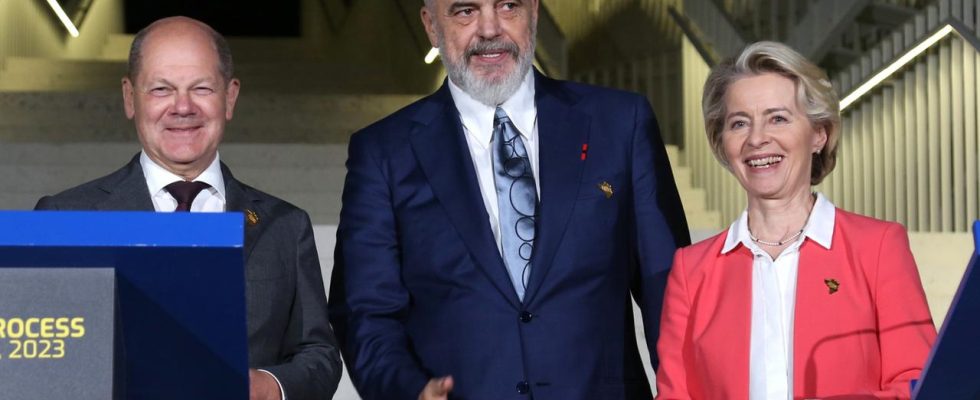The EU promised six billion euros in financial aid at a summit with the Western Balkan states and wants to use it to accelerate the six states’ prospects of accession. Chancellor Scholz called for more regional cooperation.
The EU Commission is making six billion euros available to the six Western Balkan states to stimulate the reform process and accelerate accession to the Union.
With two billion euros in grants and four billion in loans, the gross domestic product of the six countries should double this decade, said EU Commission President Ursula von der Leyen in Tirana after the conclusion of the “Berlin Process” summit.
Scholz promotes accelerated speed Accession process
Chancellor Olaf Scholz and Albania’s Prime Minister Edi Rama pushed for a quick accession process. “The countries should have joined the EU long ago,” said Scholz, noting that Albania, Montenegro, Serbia, Kosovo, Bosnia-Herzegovina and North Macedonia were given the prospect of joining the EU 20 years ago. “The future of the Western Balkans lies in the EU,” said the Chancellor.
EU Council President Charles Michel said the EU and the Western Balkan states must be ready to accept and join in 2030. The Commission President, however, emphasized that accession depends on actual reforms.
Scholz: “No progress” in reforms in Bosnia
Scholz and von der Leyen were cautious about calls for Bosnia to receive the green light from the EU to start accession negotiations in December. The Chancellor criticized that there had been no progress with reforms.
Von der Leyen announced that the EU Commission would present an assessment of all EU accession candidates on November 8th. The EU heads of state and government then have to decide in December.
The leader of the Serbian republic in particular is held responsible for the blockade in Bosnia. Scholz and von der Leyen urged Serbia and Kosovo to resolve their tensions. “Both sides have to de-escalate,” said Scholz, referring to an attack by a Serbian group on a police station in northern Kosovo. Both countries have an EU perspective.
Scholz called on the countries of the Western Balkans to prepare themselves for EU accession. To do this, they would also have to work more closely together. “There is no way around regional cohesion and the lasting solution to conflicts that have been simmering for far too long.”
Von der Leyen: Gradually loosen access to the internal market
The dispute between Serbia and Kosovo overshadowed the first summit of the “Berlin Process” outside the EU and in the region. The six countries in the region agreed on further mutual recognition of professional qualifications.
Von der Leyen said the EU would gradually loosen access to the EU internal market and increase financial aid in return for completed reform steps. Albania’s Prime Minister Rama praised the six billion package as a completely new step. The Western Balkan countries would now be rewarded for reforms on the way to the EU and not just after accession.
Last year, the Western Balkan states signed three mobility agreements, which four of the six countries have now ratified. It is now possible to travel from one country to another or to accept job offers in a neighboring country using only an identity card, praised Scholz.
Scholz: Reward progress in North Macedonia
A focus of the “Berlin Process” this year was how the energy supply in the region can be decarbonized and converted to renewable energies. Germany wants to support this with 1.5 billion euros. The federal government will also provide 73 million euros for a new renewable energy program in Albania, said Scholz.
Scholz insisted that the EU also had to reward the progress in North Macedonia. So far, the EU state Bulgaria has prevented further rapprochement by insisting on a constitutional change in the Western Balkan state. In North Macedonia, the constitutional reform presented by Prime Minister Dimitar Kovacevski has so far failed due to the conservative opposition.

